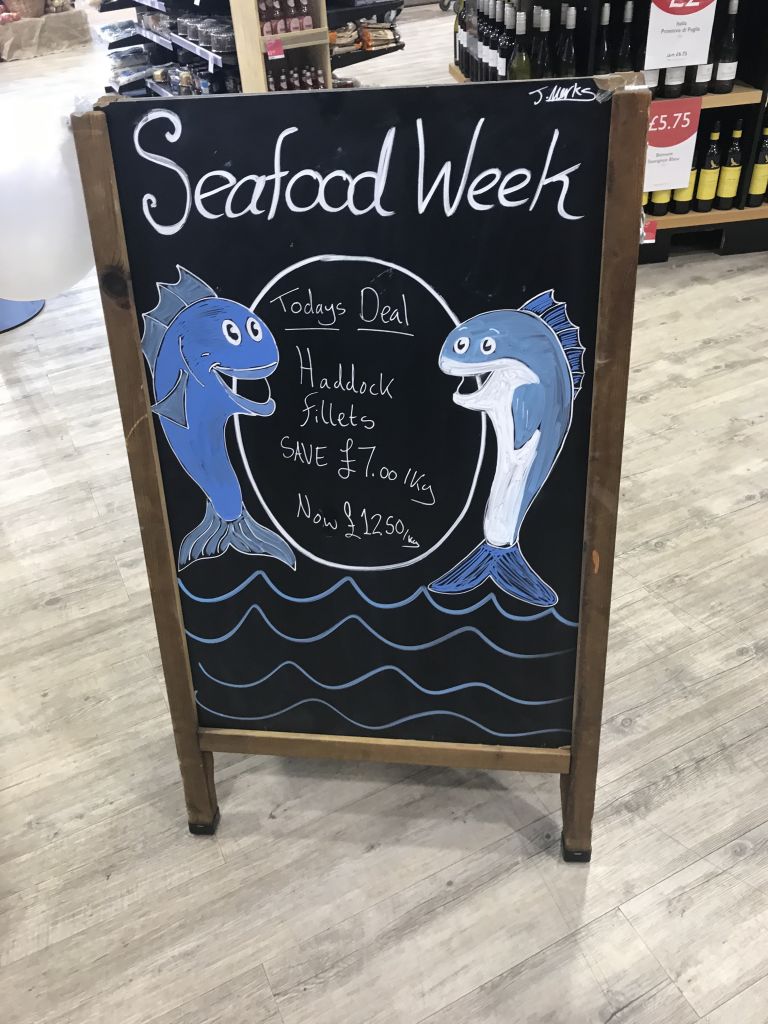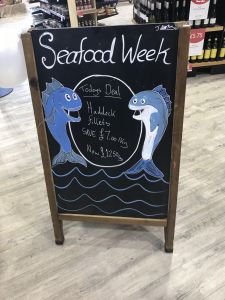Over a barrel: This week, we were hoping to restrict our comments to matters appertaining to the market, but we were interested to see that a short film from Canada has just been made available online and should be essential watching. The reason for the haste is that it is free to watch until the end of the month after which it will be pay to watch.
This excellent short film is titled ‘Over a barrel’ and features Vivian Krause, the independent researcher who uncovered the campaigns paid for by large charitable trusts to demarket farmed salmon in North America. The film, which refers to her salmon work, shows how similar US interests have been pumping money into Canada to prevent competitive exports of oil.
https://www.youtube.com/watch?v=NPax7r7Kv2c
This may all seem a long way away from what is happening across the other side of the Atlantic but the $33 million campaigns since the early 2000’s continue to provide the impetus for the ongoing crusades against salmon farming in Europe.
This is notwithstanding the fact that funding from those with their own vested interests continues to be used to promote salmon farming in the worst possible light. We, at Callander McDowell, have previously written about the US clothing company Patagonia, who funded the production of the film Artifishal about the negative impacts of salmon hatcheries in the US but then inserted a few minutes of extra footage arguing salmon farming was just as bad. Patagonia then funded numerous showings of the film in the UK and Europe fronted by their new partners, the angler’s representative organisation, Salmon & Trout Conservation.
Regular readers will know that we attended the UK premiere of the film and were met at the door with a request to not ask disruptive questions. Our understanding was that in return Patagonia would be willing to sit down and have a more open chat. However, like much of the angling sector, Patagonia now seem reluctant to talk. As it happens, their only UK store is in Manchester, which is where their UK office is also based. We have visited the store and engaged with one member of staff. We have issued an invitation to visit a salmon farm which has not yet been accepted.
Patagonia appear to promote themselves as helping safeguard the environment and one way they advocate is by reducing consumption, but this doesn’t seem to ring true to us whilst standing in a retail outlet amongst racks of expensive consumer clothing. We were loaned a copy of their handbook ‘tools for grassroots activists’ and were asked to read it but we struggled to get past the introduction. This is about how Yvon Chouinard, founder of Patagonia, became involved in environmental issues. He writes about how a local surfer asked for support to lobby against the city’s development plans for the mouth of the Ventura River, situated five hundred yards from Patagonia’s office.
The Ventura River had once been a spawning ground for steelhead and chinook salmon but then two dams were built, and the river was diverted killing the fish run. During the early 1970s, the city developers argued that the river was dead and therefore that further development would have no effect on local wildlife.
Mr Chouinard continues: “Then Mark Capelli, a young graduate student gave a slide show of photos he had taken along the river of birds that lived in the willows, the muskrats, water snakes and eels that spawned in the estuary. Then he showed slides of steelhead smolts, proving that several dozen steelhead still came to spawn in the ‘dead river’. The development plan was thrown out.” Local groups subsequently worked to further clean up and improve the river.
This is a really nice story about fighting development to ensure that the local river again became a haven for fish and other wildlife and if that was the end of the story, we would have no argument against Patagonia and the company’s environmental crusade. However, on turning the page there is a photo of the young student Mark Capelli. The photo is titled – ‘Mark Capelli fishing for southern steelhead in the Ventura River ca 1978’. The full page black and white photo shows Mr Capelli in full fishing gear holding a dead steelhead salmon. Surely, if Mr Chouinard is so concerned about saving the local river and its wildlife then he cannot support killing these threatened fish for sport. Clearly, with such a large image prominently displayed in the book, then he does not see it as being an issue.
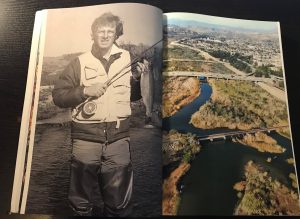
Forty years on, it seems nothing has changed because whilst Patagonia use their wealth to attack the salmon farm industry, they openly support those who actively catch and kill thousands of threatened wild fish for sport.
The book is available on Amazon at https://www.amazon.co.uk/Tools-Grassroots-Activists-Practices-Environmental/dp/1938340442/ref=sr_1_1?keywords=tools+for+grassroots+activists&qid=1571861494&s=books&sr=1-1
Fish choice: The Times newspaper recently reported that the public can ‘eat wild sea bass again as stocks slowly recover’. The paper says that the successful introduction of restrictions on catching sea bass has prompted the Marine Conservation Society (MCS) to remove wild sea bass from their red rated ‘fish to avoid’ list. Instead, because recovery has been limited, the MCS have placed wild sea bass in its ‘don’t eat too often’ category.
Surely, if stocks of wild sea bass are recovering only slowly and stocks are still limited, then the fish should remain as red rated in order that stocks be allowed to fully recover before exploitation restarts. It’s not as if consumers who want to eat sea bass don’t have an alternative because there are plenty of sea bass available that come from farms. It seems that the MCS are pandering to a minority who want to see wild sea bass back on menus despite a limit on supply.
We, at Callander McDowell, are not surprised. We have always believed that the MCS are out of touch with the marketplace when it comes to their Good Fish Guide. Their latest recommendations highlight the enormous divide between their recommendations and what consumers actually eat.
The Times published the latest sustainable choices recommended by the MCS. It almost appears to be a list for Brexit with an almost British focus.
Oysters, mussels and King prawns (British farmed).
Atlantic halibut (British farmed)
Herring (North Irish Sea)
Plaice (British caught in the North Sea)
European hake (British caught)
The problem is that UK consumers are largely uninterested in these species so telling them that they are sustainable is a waste of time. Equally, telling consumers to buy British farmed prawns is pointless given that there are a couple of unproven pilot farms in operation. Halibut from Gigha is certainly a treat, but these fish come from just one farm and even working flat out, they cannot supply enough for a wider British public. The hake is very much on trend as a chef’s fish, but it is still not widely available in stores.
By comparison, British consumers prefer buying the Big Five. These do not appear on the latest selection of fish to eat although cod from the North Sea is listed as one to avoid. Of the Big Five, cod is listed as a best choice when MSC certified. Haddock is also listed as a best choice when MSC certified. Tuna, whether Albacore, skipjack of yellowfin is listed as a best choice when MSC certified. Coldwater prawns also appear as best choice when MSC certified and although king prawns are not listed, they are available as ASC certified. Finally, the last of the Big Five is farmed salmon The MSC have it listed as a best choice when certified as organic, but we know that the MCS are not favourable to salmon farming. They rate Scottish salmon as a 3 which means that it is OK to eat occasionally. (We note that they don’t list ASC certified salmon in their guide). Their objections include the use of wild fish as feed. This objection to feeding fish to carnivorous fish is nonsense given that they green rate wild salmon from the Pacific. These fish convert wild fish at a rate of 12:1, whilst farmed fish convert at levels as low as 2:1. At the same time, the MCS do not seem to mind that hundreds of thousands of tonnes of wild fish goes to feed pet cats and dogs. It seems they have their priorities all wrong.
We see no reason why consumers should not be eating the Big Five fish especially as they are all certified as sustainable. The MSC staff are welcome to eat British farmed king prawns if they think it makes a difference, whilst we would encourage the public to eat the common-sense choice.
Seafood Weak: Seafood Week has come and gone, and we suspect that yet again this annual promotion has failed to reverse the downward trend of fish consumption. In our view it is simply an exercise to demonstrate that the seafood industry is doing something to promote fish and seafood regardless of whether it has any impact or not.
Seafood Week and then Seafood Fortnight was a regular event in the seafood calendar for many years, but it became increasingly apparent that it has not persuaded consumers to eat more fish or for non-fish-eating consumers to start to do so. After intense discussion the campaign was dropped.
In recent years, the annual promotion was resurrected into what we have today. However, since its reintroduction, fish consumption has continued to fall. Last year, the promotion was hardly noticeable at all with nothing in the retail sector and a focus on social media. However, the bulk of the traffic was simply seafood people messaging and congratulating other seafood people.
We, at Callander McDowell, hate always writing about the negative so it is with some pleasure that we can record we actually saw evidence of the Seafood Week promotion in the retail sector this year. We still don’t think it had any impact on changing consumption, but it was slightly more visible than in previous years.
The main proponent of Seafood Week in the retail sector was Booths. However, Booths is a small family run chain in the North West of England and in terms of the whole of the UK, coverage was hardly significant. In addition to daily offers advertised on the fish counter, at least one store we visited displayed a blackboard at the store entrance advertising Seafood Week.
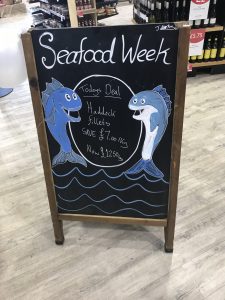
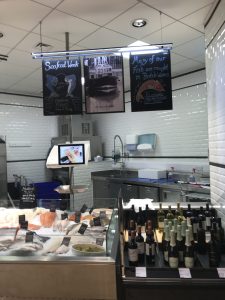
We also saw that M&S displayed a Seafood Week shelf label although we did not actually see this during the week itself but during the following week. Morrison’s mentioned Seafood Week on the website. Otherwise, Seafood Week was invisible throughout the rest of the retail sector.
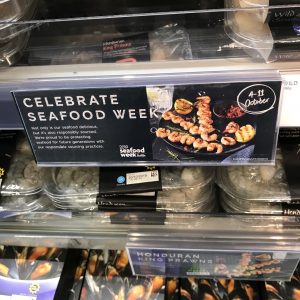
The problem is that Seafood Week is just one week, and it has to fight for consumer attention against all the other promotional weeks. Curry Week overlapped with Seafood Week and there will have been other weeks both before and after. For us, at Callander McDowell, the biggest hurdle is that Seafood Week doesn’t really reach out to all those members of the public who rarely eat fish. For example, the shelf label in M&S was attached to the shelves displaying fish so those members of the public who never or rarely eat fish are not going to see that it is Seafood Week as they are unlikely to visit these specific shelves.
The 2040 strategy aims to almost double consumption to two portions a week. A more radical strategy than Seafood Week is going to be required to reverse the current trend, let alone achieve the desired two portions every week.
A fishy tale: The Keynote speaker at the recent Seafood Summit held in Scunthorpe was Winus Sloot, sales and marketing director of Dutch company Fish Tales.
Fish Tales was conceived by Dutch fishmonger Bart van Olphen who thought that there was a better way to harvest and supply fish to consumers. He sought truly sustainable fish originating from fishing communities that fish with a respect for nature. These communities choose the right fishing techniques and catch no more fish than is healthy for the fish stock. Fish Tales aims to provide these communities with a market for their fish at a fair price. It would have been interesting to hear Mr van Olphen’s own story and we don’t know whether he was ever in line to be the speaker. Instead, Mr Sloot provided the Keynote narrative. It is available on YouTube for those interested.
https://www.youtube.com/watch?v=Hzj5xLqbFFA
Although, Mr Sloot didn’t specifically mention the Fish Tales mission, the website states that Fish Tales wants to ensure that everyone including future generations can enjoy the tastiest fish that has been produced in the most responsible way possible.
We, at Callander McDowell, are aware that sustainability is not the most important driver of consumer buying decisions and that price and taste can be often even more influential in what the consumer buys. Fish Tales are not a major brand in the UK market, but Sainsbury’s do stock Fish Tales tuna in selected stores.
Their multipack of three 80g cans of Fish Tales Albacore tuna in water or in oil are priced at £4.50 for 240g which is equivalent to £26.80/kg. By comparison, the cheapest multipack of tuna costs £8.30/kg. This is Sainsbury’s own label tuna in brine and is the cheaper Skipjack tuna, but it does come from a well-managed fishery that uses a FAD free purse seine to catch the fish. Clearly, a comparison between these packs would be unrealistic because they contain different species of tuna. Instead, Sainsbury’s stock a can of Albacore tuna under their Taste of the Difference label. The 160g can is priced at £2.25 equating to £18.80/kg and is available in both oil and water.
The difference between Fish Tales and Sainsbury’s TTD Albacore tuna is £8/kg so the question is whether it tastes better, is more responsibly produced or whether shoppers are simply paying for the name?
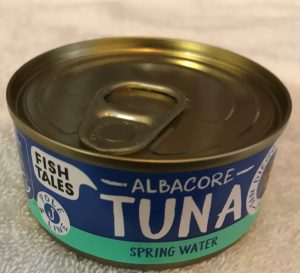
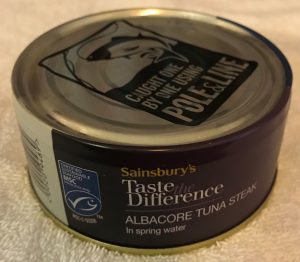
The reality is that the tuna in both cans looked the same and tasted the same. There was no discernible difference between the two. Both are MSC certified and both use pole and line to catch the fish. Both cans are produced in Spain using fish caught from the Pacific. The only difference is the Fish Tales pack includes an image of the head of ‘Jack’ from San Diego. Jack is a fisherman from the American Albacore Fishing Association. This sounds very much like some very organised business rather than a perception of helping a small artisanal fisherman. Like all consumers, you pay your money and make your choice.

